Demi Moore: ‘My life as I knew it kind of exploded’
Once the highest paid star in Hollywood, Moore is back in the new adaptation of ‘Brave New World’. On the eve of the Venice Film Festival, Geoffrey Macnab catches up with her about her shocking memoir, her film about what happens if Covid gets worse, and her podcast drama about female sexual fantasy
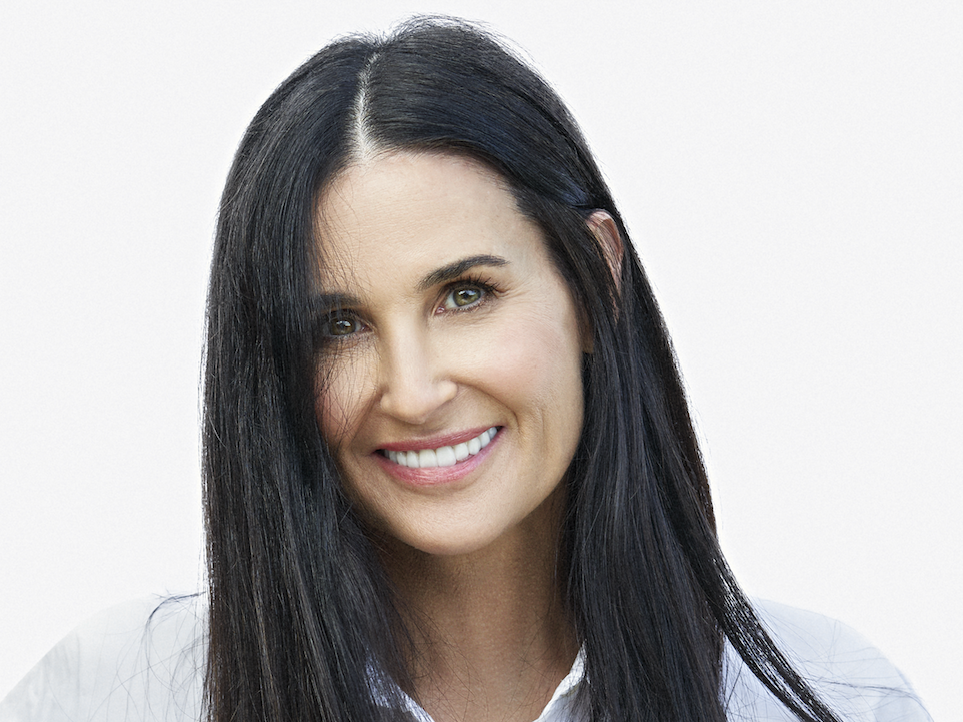
I am sitting opposite Demi Moore. Well, almost. I am in a makeshift studio in the basement of the Excelsior, the most luxurious hotel on the Venice Lido. The star of Ghost, Striptease, GI Jane et al is on a big screen, speaking to me via Zoom from Los Angeles. It’s a measure of how Covid-19 has affected film festivals that Moore is calling into the film festival rather than turning up in person.
Moore’s reputation goes before her. Once the highest paid female star in Hollywood, she has very been badly stung by the tabloids in the past. Detractors have characterised her as a high-maintenance control freak. Today, she is promoting “A Conversation with Demi Moore”, an event organised this week by MasterCard in conjunction with the Venice Biennale. True to form, in advance of the interview, she asked to vet questions. However, the bespectacled woman sitting in front of her fireplace with an Italian-made Marlene Dietrich doll perched behind her shoulder turns out to be warm, friendly and far less guarded than one might have expected. Perhaps she now realises nothing any journalist can write about her will match the frankness of her own memoir, Inside Out, published last year.
“I took a puff of synthetic pot (it was called Diablo fittingly). The next thing I remember, everything went blurry and I could see myself from above,” Moore writes in the prologue of her book about how, aged almost 50 and at a very low ebb, she had ended up convulsing on the floor and being rushed to hospital, to the inevitable delight of the gossip columnists. She doesn’t balk at sharing grisly details about the degradation and humiliation that has often accompanied her triumphs over the years.
“If you carry a well of shame and unresolved trauma inside of you, no amount of money, no measure of success or celebrity, can fill it,” Moore finishes one chapter about the period when she had just married Bruce Willis and appeared to be leading the perfect life.
I ask if writing Inside Out was cathartic. “I had made this deal to do the book and then my life kind of exploded as I knew it. I was definitely not in any place to consider sharing my life when I didn’t even feel I had a grasp of it myself,” she says – recalling the circumstances in which the memoir was commissioned a decade ago, just as her marriage to Ashton Kutcher was coming apart. (They separated in 2011 and were divorced in 2013.) “When they (the publishers) came back to me, they said we either need to let this go or to do something. What I felt is that If I could help one person by sharing what my experience has been, then it would have been worthwhile.”
Moore didn’t want Inside Out to be just another self-promoting “celebrity” autobiography. “I wanted it to be just human and about our humanity, and to be an opportunity to connect. The only way I could do that was just to be as truthful and honest about my experience as I could be. And it was healing.”
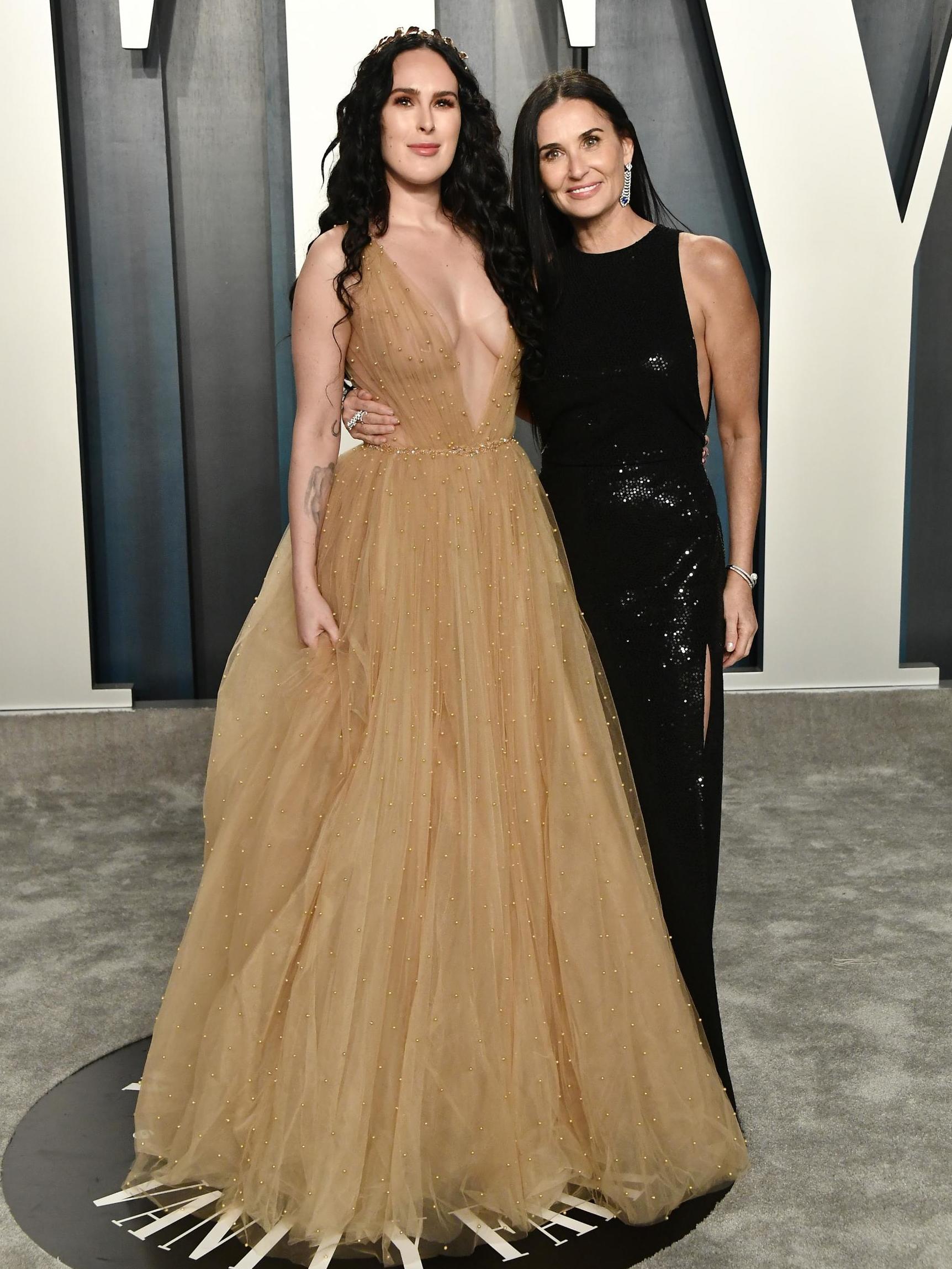
The addictions, the family upheavals, and violence she witnessed growing up in Roswell are all chronicled in painful detail. A high-school dropout, she was from a wildly unstable background. Her father was a drinker and gambler who turned to a mafia loan shark to cover his gambling losses. Her parents were constantly fighting. “Your mother and father are supposed to act as a kind of touchstone along the path to the future – offering insight on what to reach for, what to look forward to. For me, that picture was dismal,” Moore described her deeply dysfunctional upbringing. To cap it all, when she was 14, she discovered that her real biological father wasn’t the man married to her mother. After the family moved to southern California in the mid-1970s, when she was still a schoolgirl, Moore was already hitting “the hard liquor and Marlboro reds”.
Moore, though, is nothing if not resilient. She wouldn’t have succeeded in Hollywood unless she had had immense drive.
Moore’s work ethic remains as strong as ever. During “the super, hardcore lockdown”, as she calls it, she was busy with a new project, a podcast, Dirty Diana, about a woman who “escapes her carefully curated life and dying marriage” by running an erotic website where women share their secret fantasies. Moore produces and stars in the podcast. She is hoping now to spin it off into a “long form” TV series.
“Shana Feste, the writer-director, had explored doing this as a film and then it changed its form. When it got to me, the idea was to do it as a podcast. I think the subject matter, being about female sexuality and female sexual fantasy through the female gaze was really intriguing to me,” Moore says, explaining why she came aboard. “It’s an interesting thing because the [podcast] outlet allows you the opportunity to explore something without the weight and the cost of a pilot and to see if there is an audience for it.”
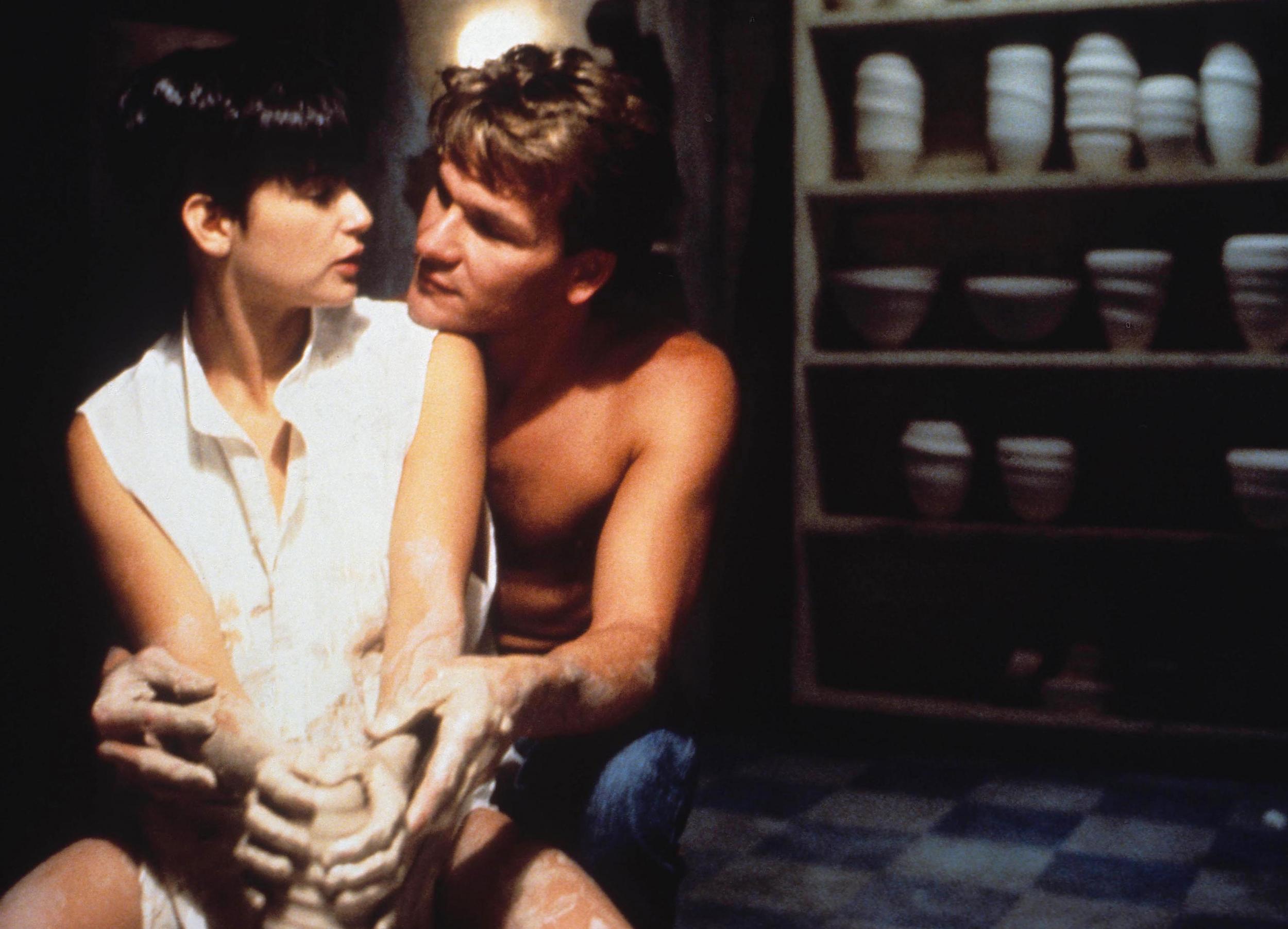
One of the attractions about Dirty Diana was that, unlike some of the films in which Moore has appeared in the past, it “wasn’t exploitative.”
When I ask if Moore thinks the film industry is in a healthier place now in terms of attitudes toward race, gender and age than when she started out, she replies instantly: “100 per cent. Definitely. We are moving in the right direction. We have more work to do but at least we are now operating with a level of awareness and consciousness that was not there. It is almost like the blinders [blinkers] have been taken off.
“We are operating from a new baseline and I think we are better because of it,” Moore says.
It’s hard to imagine, for example, that a film like Indecent Proposal (1993), in which a rich stranger offers an impoverished married couple a million dollars if the wife (played by Moore) will sleep with him, would be greenlit by a mainstream studio today. Post-Weinstein and #MeToo, that premise simply wouldn’t play.
Back in the mid-1980s, Moore was one of the Bratt Pack – a term she doesn’t much like – of young stars like Molly Ringwald, Rob Lowe, Andrew McCarthy and Emilio Estevez who appeared in coming-of-age movies which hit a nerve then and are still watched today. She co-starred in Joel Schumacher’s St Elmo’s Fire. I ask if she looks back on the period with affection and whether she regarded Schumacher, who died earlier this summer, as a mentor. It’s a naive question. In Inside Out, Moore gives a graphic description of her destructive cocaine and alcohol consumption at the time she was about to start work on the film. Schumacher and the producers got her into rehab a little over two weeks before shooting began. She cites their action, which enabled her to get sober, as a key turning point in her life and career. “To this day, I see this as some version of divine intervention,” she writes.
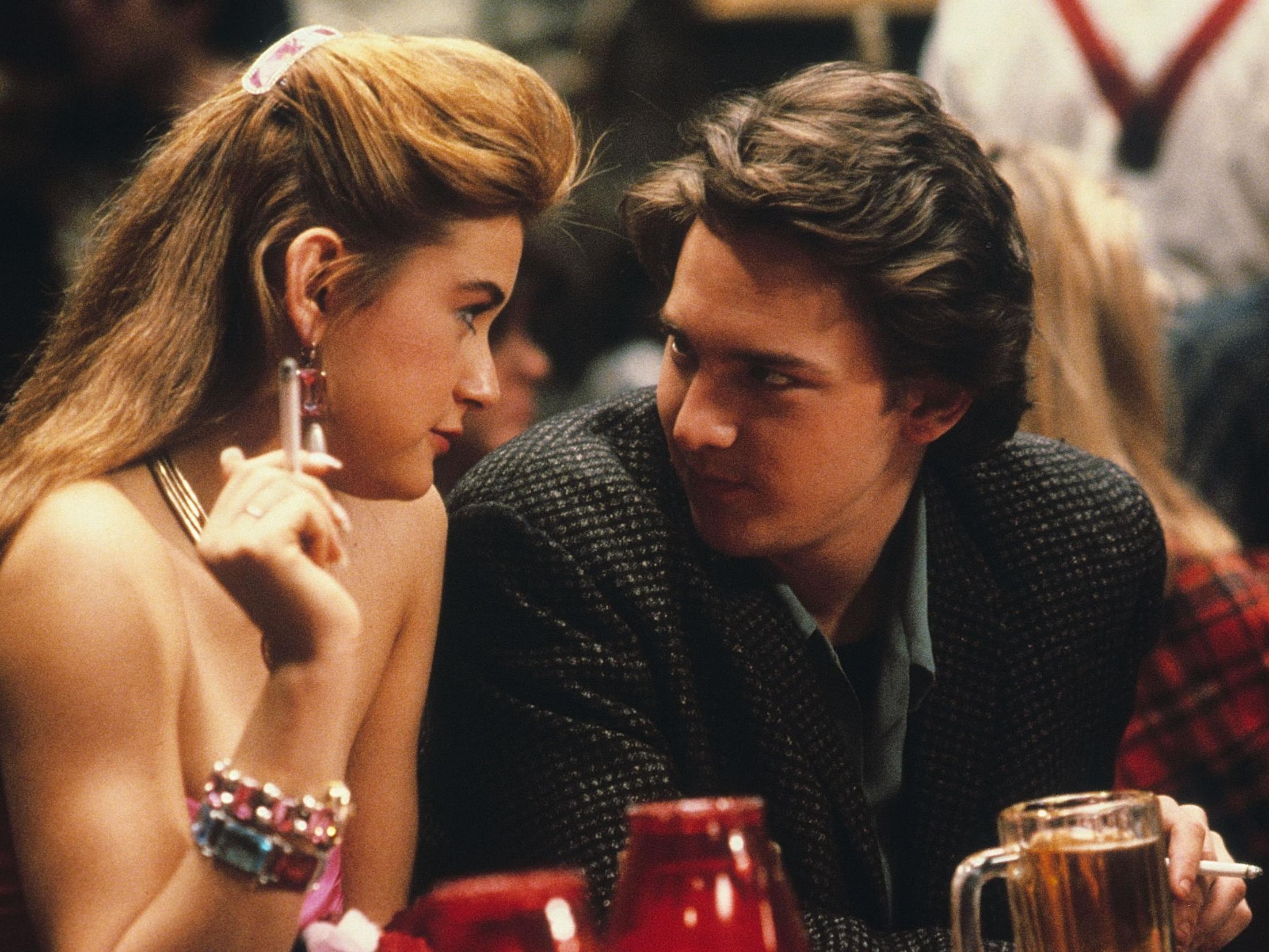
Whatever her personal travails at the time, Moore is nostalgic for this era and proud to have been part of the new movement. “If you look before St Elmo’s Fire and also Breakfast Club and Sixteen Candles, if you really look, there weren’t a lot of stories that were about young people. This really changed and opened up a whole opportunity. I write about it in my book… Joel really took a stand for me,” she says. “He did for me what I couldn’t do for myself and stuck by me to be in that film. I will be eternally grateful to him. It [Schumacher’s death] was a very sad loss. He was a flamboyant figure who was bigger than life. He bravely took on doing St Elmo’s and opened doors for a lot of us.”
Without his support, Moore suggests, her career might have been over almost before it started. As it stands, she is still heavily in demand, more than 30 years later. Moore currently has several new projects. She appears, with blonde hair, in HBO and Sky’s soon-to-air major new adaptation of Aldous Huxley’s Brave New World, as a woman who has broken the test-tube-baby orthodoxy of a future “New London” by becoming a mother. She is also starring in pandemic thriller, Songbird, set in a near future in which the population is again under lockdown as the virus continues to rage and the gulf between the rich and poor becomes ever more pronounced.
The new film, she cheerfully explains, is about “what happens in our worst nightmares with this virus. You know, it is looking at a world that has separated between those who have and have not, and the desperation and fear that can take over.”
“My character is a woman, a mother and wife, who has resorted to some black market dealing to survive,” Moore continues. “It’s a world in which if you’re immune, which my character is, you have almost a free pass to move about whereas everyone else cannot.”
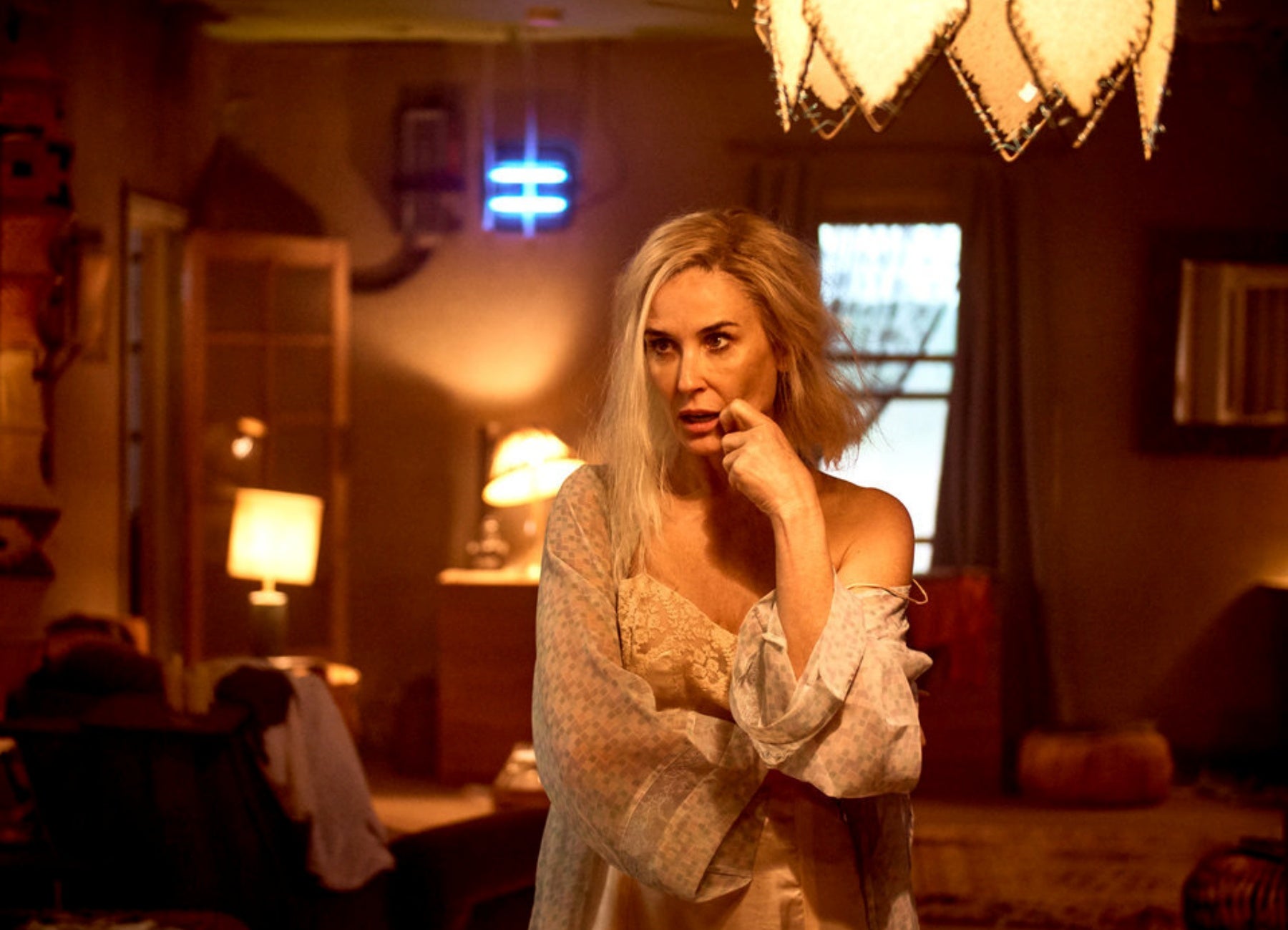
Moore doesn’t sound too disappointed that she hasn’t been able to attend Venice in person. She has been to relatively few film festivals. “The hard part is if you are in my position, you don’t really have the luxury to really experience the festival. If you could go completely anonymously, I think it would be wow, incredible, just to see what is happening.” Her festival experience, by contrast, is to endure trial by paparazzi; to take part in photo shoots, red carpet events and give endless interviews. “I don’t look at it as negative. I really try to appreciate what it is serving. It can just be a lot of… work.”
After the ups and downs of her career, Moore remains as resilient as ever. Asked what advice she has for anyone looking to break into the industry today and she suggests bloody-mindedness is still the crucial quality. “You have to really want this. You have to really be willing to put in the effort, knowing you’re going to face a lot of rejection,” she cautions “My biggest advice is don’t take anything personal and don’t look for someone outside of you to validate you.”
Brave New World is scheduled for a UK release later this year
Join our commenting forum
Join thought-provoking conversations, follow other Independent readers and see their replies
Comments
Bookmark popover
Removed from bookmarks